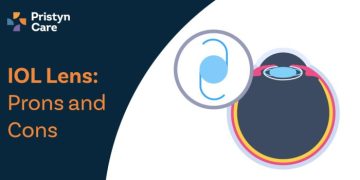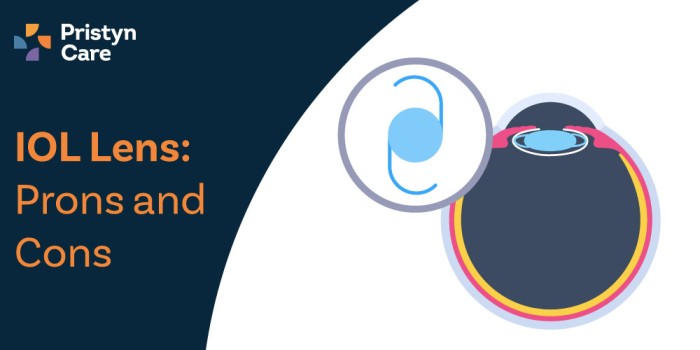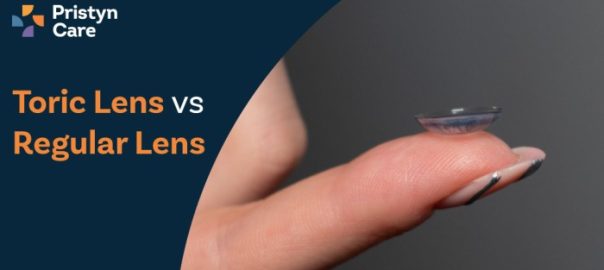![]() Views: 106
Views: 106
IOL Lens: Pros and Cons
A common condition that affects our eyesight is cataracts.
Dedicated Support at Every Step!
Our Doctors are available 24 hours a day, 7 days a week to help you!
Thanks to modern medicine, a typical solution is using intraocular lenses (IOLs) during cataract surgery. In this blog, we will delve into the pros and cons of these lenses and help you understand their role in restoring vision.
Table of Contents
Understanding IOLs
Intraocular lenses (IOLs) are tiny, artificial lenses that replace the eye's natural lens, which might have become cloudy due to cataracts. IOLs are surgically implanted in the eye during a cataract operation and serve as a permanent solution to enhance vision.
The way an IOL works is simple yet fascinating. It focuses light that enters your eye onto the retina—the light-sensitive tissue at the back of your eye. This process allows you to see images clearly, much like your natural lens would.
The advent of IOLs has revolutionised the field of ophthalmology. It provides a ray of hope for those who have lost their vision due to cataracts. However, as with every medical procedure, there are certain pros and cons associated with IOLs, which we will explore in our upcoming sections.
No Cost EMI, Hassle-free Insurance Approval
Pros of IOLs
Intraocular lenses (IOLs) have come a long way, offering several advantages that have considerably improved the lives of people dealing with vision problems. Here are some of the key pros of IOLs:
- Clearer vision post-surgery: One of the most significant benefits of IOL lenses is the clearer vision they offer after surgery. Patients often report a drastic improvement, with some even achieving 20/20 vision.
- Freedom from glasses: With IOLs, many patients have found independence from their glasses or contact lenses for most, if not all, daily activities. This freedom can be quite liberating and contribute to a better quality of life.
- Improved quality of life: Speaking of quality of life, many patients who have undergone surgery to implant IOLs report overall improvements in their lifestyle. The ability to see clearly without additional aids often translates to increased confidence and freedom.
It is important to note that while these benefits sound promising, the results can vary from person to person based on individual health factors and the success of the surgical procedure.
Cons of IOLs
While IOLs undoubtedly bring numerous benefits, it's essential to understand the potential drawbacks as well. Here are some considerations you might want to keep in mind:
- Complications during or after surgery: Like any other surgical procedure, operations involving IOLs also carry risks. These could range from minor complications such as mild discomfort or temporary visual disturbances to more serious conditions such as infection or retinal detachment.
- Issues with night vision or glare: Some patients report experiencing issues like poor night vision or an increased sensitivity to bright light and glare post-surgery.
- Possibility of needing eyeglasses even after surgery: While many patients do gain more independence from eyeglasses after surgery, it is not uncommon for some to still need them for certain activities, particularly reading or working on a computer.
It's important to have a comprehensive discussion with your doctor about the pros and cons before deciding to opt for IOLs. Making an informed decision can help you manage expectations better and ultimately lead to more satisfactory outcomes.
MS, DNB, FICO, MRCS, Fellow Paediatric Opth and StrabismusMobile
FREEConsultation Fee
Choosing the Right Lens: Factors to Consider
Choosing an intraocular lens (IOL) is a significant decision that requires careful consideration. For those of you considering an IOL lens for your eyes, there are several factors to bear in mind.
- Lifestyle: Consider your lifestyle. If you lead an active life and require clear vision for activities like reading, driving, or playing sports, you might benefit from a multifocal IOL lens.
- Professional Requirements: If your job involves detail-orientated tasks such as drawing or sewing, a monofocal IOL for near vision could be suitable for you. On the other hand, if your job involves more distance vision tasks, such as driving or lecturing, a monofocal IOL for distance vision may be more suitable.
- Existing medical conditions: Also consider any other medical conditions that you have. If you suffer from macular degeneration, for instance, a certain type of IOL might offer better results than others.
The Cost Factor
The cost can be a significant factor when choosing an IOL lens. It's important to understand that while basic monofocal lenses might be covered by insurance, multifocal or accommodative lenses usually involve additional costs.
When making this decision, it's crucial to consider the pros and cons. On one hand, investing in multifocal lenses could save you money in the long run as you might not require glasses or contact lenses after surgery. On the other hand, the upfront cost is generally higher.
Choosing the right IOL lens involves considering many factors, including your lifestyle, professional requirements, and budget. Discuss these factors thoroughly with your doctor to make an informed decision that best suits your needs and preferences.
Conclusion
The core benefits of IOL lenses are numerous. They can significantly enhance visual acuity, reduce dependency on eyeglasses, and generally improve the quality of life for those suffering from cataracts or other vision-impairing conditions.
However, it's worth noting that IOL lenses do have their share of disadvantages. Potential side effects may include glare, halos, or double vision. Additionally, secondary cataracts could develop after lens implantation. However, these cons are typically outweighed by the substantial improvement in vision and quality of life.
Despite some potential drawbacks, IOL lenses have proven to be a boon in transforming lives by restoring sight. This technology has allowed countless individuals to regain their independence and enjoy life’s simple pleasures without the hindrance of poor vision.
It's vital to remember that making a decision about eye surgery is not something to be taken lightly. It's a significant step that involves careful consideration and professional advice. Therefore, if you're considering this route, don't hesitate to consult your family doctor or an expert ophthalmologist to discuss your specific circumstances. They can guide you through your options and help you make an informed decision on what's best for your vision health.
FAQs
- Can anyone undergo an IOL lens implantation?
Most people can have an IOL lens implant, but certain conditions like high myopia or severe diabetic retinopathy might make you ineligible. A detailed consultation with your doctor can determine if this procedure is right for you. - Is the IOL lens implantation procedure painful?
The procedure is usually performed under local anaesthesia, so you shouldn't feel any pain during surgery. However, mild discomfort might be experienced post-surgery, which usually subsides within a few days. - Does an IOL lens guarantee perfect vision post-surgery?
While an IOL lens can significantly improve vision, it doesn't necessarily guarantee perfect sight. The effectiveness largely depends on factors such as the patient's overall eye health and whether there are pre-existing conditions like macular degeneration or glaucoma. - What are the potential complications associated with an IOL lens implant?
Potential complications include increased pressure inside the eye (glaucoma), retinal detachment, clouding of the lens (secondary cataract), and in some cases, infection or inflammation. - How long does it take to recover from an IOL lens implant surgery?
Recovery time can vary, but most people start seeing clearly within a few days to weeks post-surgery. However, it may take up to eight weeks for complete healing and vision stabilisation. - Are there any precautions that need to be taken post-IOL lens surgery?
Definitely. It's vital to avoid strenuous activities, protect your eyes from dust and pollution, use prescribed eye drops, and attend all follow-up appointments with your doctor. - Will I require glasses after an IOL lens implant?
This varies from person to person. Some people may still need glasses for certain activities like reading or driving at night, depending on the type of lens implanted and their eye health condition. It is best to discuss this with your doctor prior to surgery. - Can I drive immediately after getting an IOL lens implanted?
Doctor's advice varies depending on individual cases, but generally, it's advisable to wait at least 24 hours before driving post-surgery. It's important to ensure your vision has adjusted and you're comfortable before getting back behind the wheel. - What types of IOL lenses are available?
There are several types of IOL lenses available, including monofocal, multifocal, accommodating, and toric lenses. Each type is designed to cater to different vision needs and lifestyle requirements. - Will I feel the IOL lens in my eye after surgery?
No, you shouldn't feel the IOL lens in your eye following surgery. The procedure is designed to ensure comfort and minimal disruption to your daily life












